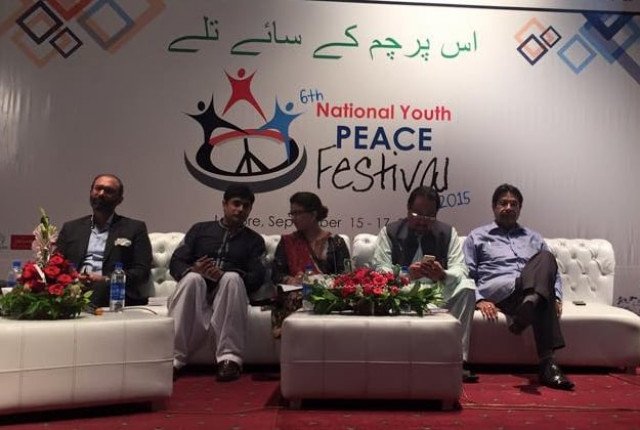Closing ceremony: ‘Fractured democracy better than no democracy’
Three-day national youth peace festival concludes

Three-day national youth peace festival concludes. PHOTO: fb.com/CDAPAK
“We need to fight for the rights of labourers and farmers,” singer Jawad Ahmed said on Thursday.
Ahmed, the chairperson of the International Youth and Workers’ Movement, made the remarks while giving the keynote speech at the closing ceremony of the 6th National Youth Peace Festival 2015. “Learn about the system to revamp it. Learn about the legal system, the media and politics...,” he said.
Chanan Development Association (CDA) Executive Director Shahzad Khan thanked the guests and delegates. He called on the delegates to present the Lahore Youth Declaration on the occasion. The declaration will be placed before Chief Minister Shahbaz Sharif soon.
Oxfam Novaib Programme Officer Wasim Durrani said he was proud of the way the CDA had shed light on youth issues. He said this had been executed in such a manner that one had no option but to pay attention to it. “Youngsters constitute 64 per cent of the nation’s population... you have to guide yourself,” Durrani said.
Punjab Youth Parliamentary Caucus Chairman Wickas Mokal exhorted youngsters to ascertain and pursue the purpose of their lives. “You might be alone when you initiate something. This should not deter you from doing something right,” he said.
Youth Parliament of Pakistan (YPP) chairman Ibrarul Haq said the YPP had been formulated in a bid to empower youngsters by enabling them to understand their importance in the society. “One has to remember what is more important. Speeches or the implementation of what is contained in them,” he said.
Senator Ateeq Sheikh of the Muttahida Qaumi Movement (MQM) said politics was synonymous with serving others. “Do not depend on anyone and set achievable targets,” he said. Rana Arshad of the Pakistan Muslim League-Nawaz (PML-N) said he could envision a promising future for the nation by merely glancing at the delegates present on the occasion. “It is better to have a fractured democracy than no democracy at all. One only needs an idea and not a gun to bring about change,” Arshad said.
PTI Punjab deputy organiser Omar Sarfaraz Cheema said the youth of the nation were its hope. He said Pakistan was still ruled by various mafias who had wreaked havoc on the system by using communalism and provincialism as a front. Cheema stressed the importance of good leadership for revamping the nation’s fortunes. “When we travel we come across Punjabis and Sindhis but not Pakistanis. We need to unite for the benefit of the nation,” he said.
Hard questions : ‘NAP implementation lacks transparency’
Lahore. Several speakers at the National Youth Peace Festival on Thursday raised questions on the implementation of the National Action Plan (NAP) against terrorism.
As many as 600 delegates from across the country attended the session.
South Asia Partnership Pakistan Executive Director Muhammad Tehseen said Pakistan Army had been conducting an operation in South Waziristan for over a year. “There seems to be no independent information available on the operation. Journalists are not allowed to cover it. All information is provided by the Inter-Services Public Relations (ISPR).” He said lack of transparency extended to the military operation in Awaran, Balochistan. “Since last Eid, the military has been carpet bombing the area but there is no civilian oversight,” he said.
Tehseen said action against banned outfits, as outlined in the NAP, had been unsatisfactory.
“They have used the term ‘proscribed organisations’ in the NAP. Jammatud Dawa falls under proscribed organisations but NAP seems to have had no effect on its operations in the country,” he said.
“Rah-i-Haq, a party which has fielded a large number of candidates for local government elections in Sindh, has members from banned groups like Lashakr-i-Jhangvi, Lashakr-i-Taiba and Ahle Sunnat Wal Jamaat. This shows an alarming trend in the country. Banned groups now have a political face,” he said.
Human Rights Commission of Pakistan general secretary IA Rehman said NAP did not cover elimination of extremist ideas from the society.
“It is important to thwart those who promote extremist ideas and cut off funding for banned groups,” he said.
Rehman said the National Action Plan should be reviewed and revised by the parliament regularly to ensure effective implementation.
“It is important to question the premise on which it was formed,” he said.
Naveed Chaudhry of the Pakistan People’s Party Parliamentarians said extremist tendencies in the society should be discouraged.
“It is easy to criticise liberals but nobody speaks against religious outfits because they fear the consequences,” he said.
MPA Muras Raas of the Pakistan Tehreek-i-Insaf (PTI) said the work of NGOs should be monitored. He said corruption and poverty had strengthened extremist thoughts.
MPA Uzma Bukhari of the Pakistan Muslim League-Nawaz (PML-N) said policies of military regimes had fuelled terrorism in the country.
“It is unfortunate that it took us so long to decide that we must not negotiate with terrorists,” she said. “Pakistan’s political parties tried to talk to them and in return, they massacred children of Peshawar,” she said. She said the Punjab government had arrested 3,000 people over hate speech. She said despite a lot of opposition Malik Ishaq had also been exposed. “The government has directed seminaries to ensure financing through banks so that their funding can be monitored,” she said.
She said many seminaries had agreed to let the government monitor the curriculum.
Published in The Express Tribune, September 18th, 2015.



















COMMENTS
Comments are moderated and generally will be posted if they are on-topic and not abusive.
For more information, please see our Comments FAQ